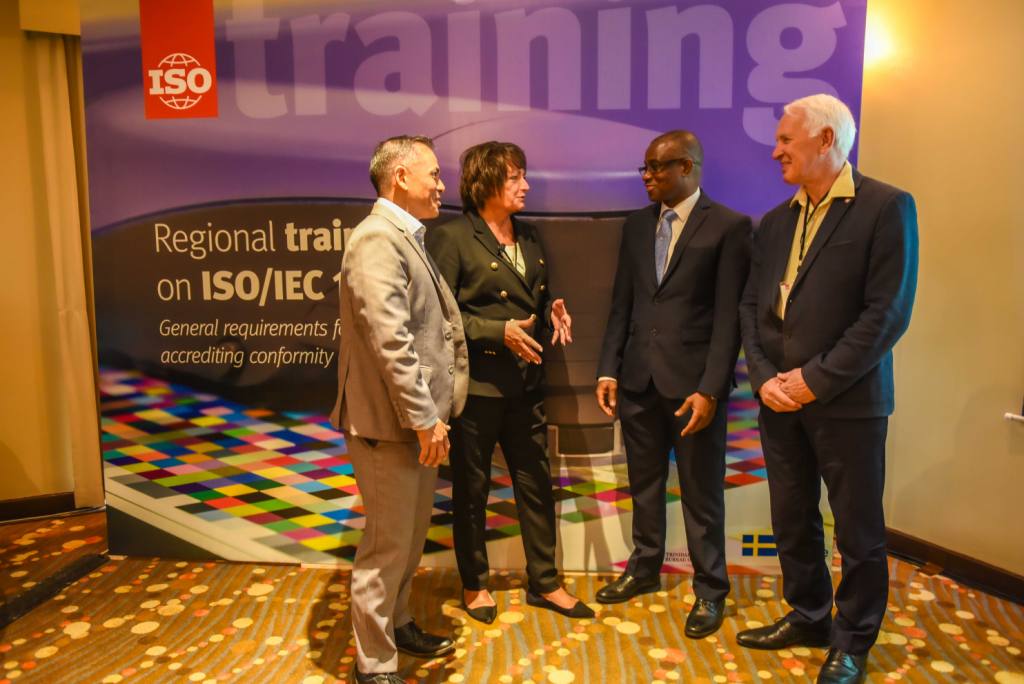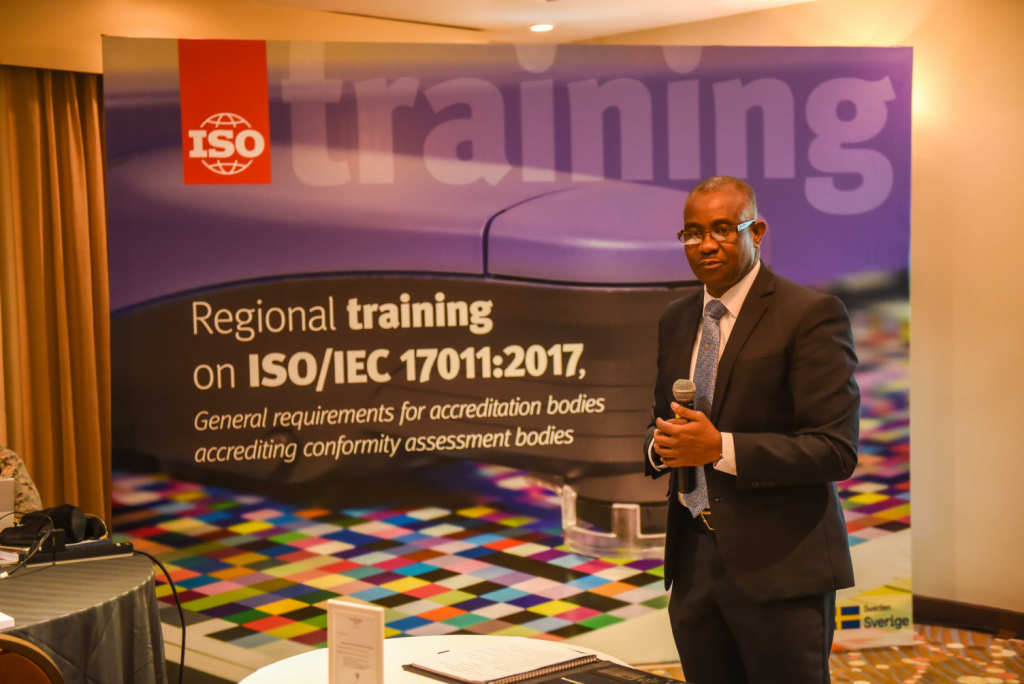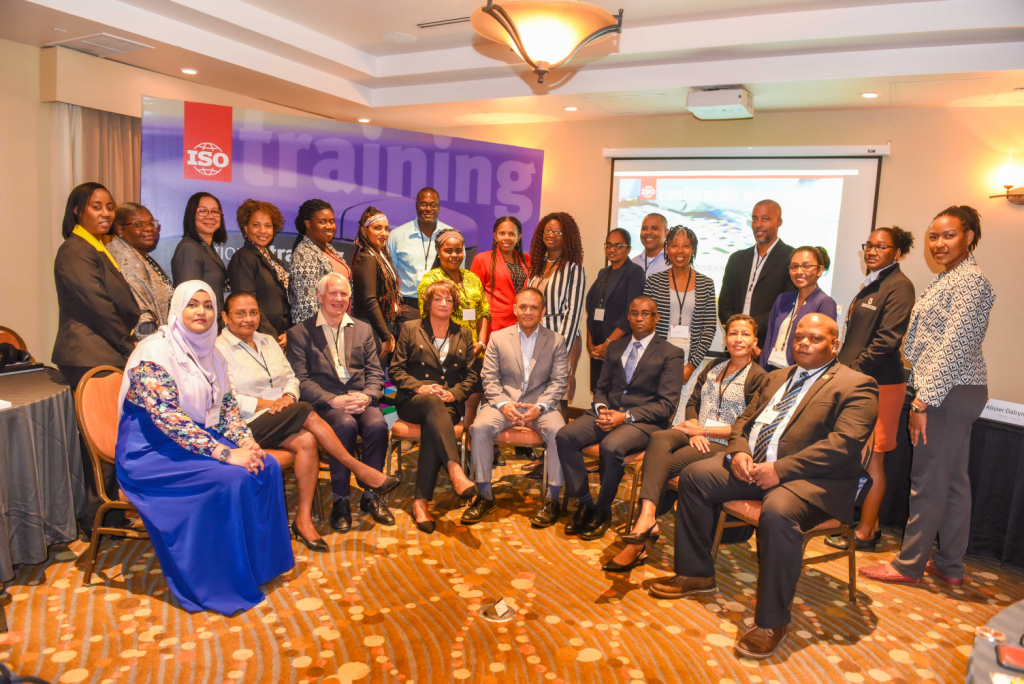 2019-08-15
2019-08-15
“In today’s global economy, millions of products and services are traded across borders and there are valid concerns surrounding their functionality, reliability, and safety and impact on consumer health and the environment.
In order to demonstrate compliance with a country’s regulations, products and services must be tested, inspected and certified to show conformance to international quality, safety and environmental requirements. As such, internationally accredited conformity assessment processes are essential to international trade.”
Mr. Michael James Director of Business Development of the Ministry of Trade and Industry (MTI) made these pronouncements while delivering remarks at the opening of the Regional Training Programme on the International Standard ISO/IEC 17011:2017 – Conformity assessment –Requirements for accreditation bodies accrediting conformity assessment bodies on Tuesday 13th August, 2019 at the Courtyard by Marriott, Audrey Jeffers Highway, Port of Spain.
Mr. James reiterated the importance of such programmes serve to build technical capacity. He said, “It is expected that this programme will improve the overall performance of the various national accreditation bodies in the region, and deepen the understanding of the requirements of an accreditation body towards international recognition.”
He urged participants in the workshop to not only apply the knowledge gleaned over the three-day period (13th-15th August 2019), but to continue to follow the ongoing developments from the United Nations, he stated, “It is important to note that this programme is one, that supports the United Nations Sustainable Development Goal 9 – to build resilient infrastructure, promote inclusive and sustain industrialization and foster innovation. It also directly impacts the trade environment of our respective economies.”
Conformity Assessment Bodies (CABs), i.e., testing and calibration laboratories, certification bodies as well as inspection bodies are the foundation that supports an efficient and effective trade environment. In today’s business environment, results generated by CABs are used to influence decisions, monitor and control activities in various sectors including manufacturing, health, construction, ICT and energy to name a few.
However regulators, manufacturers and end-users must have confidence in the proficiency of CABs to adequately assess products and services. These users rely on accreditation processes to ensure that CABs are competent, and that these assessment processes are transparent and trustworthy.
In December 2018, Cabinet approved the establishment of the Trinidad and Tobago Accreditation Service for Conformity Assessment (TTASCA). TTASCA would be an independent National Accreditation body and it will be the steward and primary advocate for accreditation nationally, with its scope of operation being expanded to encompass all aspects of conformity assessment: testing, calibration, certification and inspection.
Currently, the accreditation of laboratories is carried out by the Trinidad and Tobago Laboratory Accreditation Service (TTLABS) of Trinidad and Tobago Bureau of Standards (TTBS). However, this accreditation does not allow full international recognition status, which is the aim for the establishment of TTASCA. In its pursuit for international recognition, TTLABS will soon be an entity separate and apart from TTBS. It is envisaged that TTASCA will, therefore, enhance the export competitiveness of our local companies, improve the national quality infrastructure and assist in the Government’s diversification efforts.
This training workshop was hosted by the International Organization for Standardization (ISO) as part of its ISO Strategy 2016 – 2020 and TTBS, the ISO member body for Trinidad and Tobago. The aim of the training sought to enhance participants’ understanding of the framework of the ISO Action Plan for Developing Countries (APDC) 2016-2020 and the requirements for the operation of an accreditation body.
The workshop was facilitated by Carol Stewart, Group Quality Director, Element Materials Technology and Alister Dalrymple, Director, Business Development and Partnerships, AFNOR Corporate International Affairs and included a set of interactive instructional methods (such as lectures, group activities and sharing experiences) to convey the information to the participants in an effective and practical manner.
The training targeted a total of 22 participants nominated by ISO members from the Caribbean region. The nominated candidates represented persons that are working in or with the National Accreditation Bodies (i.e. from managerial and technical staff) and the National Accreditation Focal Points from National Standards Bodies in the Caribbean.

MEETING OF THE MINDS: Mr. Derek Luk Pat- Executive Director, TTBS (left) chats with ISO officials and Mr Michael James – Director of Business Development of the Ministry of Trade and Industry (MTI) (centre) prior to the start of the workshop.

WELCOME REMARKS: Mr Michael James, Director of Business Development of the Ministry of Trade and Industry (MTI) delivers opening remarks.

PHOTO OPPORTUNITY: Participants of the workshop during a photo opportunity at the opening of the International Standards ISO/IEC 17011:2017, Conformity assessment –Requirements for accreditation bodies accrediting conformity assessment bodies at the Courtyard by Marriott, Port of Spain.

